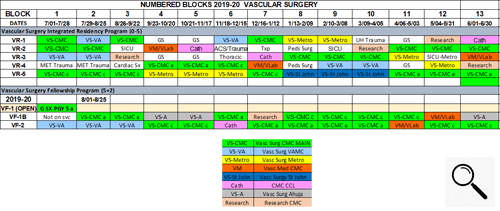Integrated Vascular Surgery Residency Training
Surgical Education and Training
 The Department of Surgery is responsible for the education of 24 postgraduate year one (PGY1) general surgery and surgery specialist residents providing care for patients with vascular disease. The Department supports training of our advanced vascular fellows in a two-year fellowship program that has completion of a general surgery residency as a necessary precursor. Similarly, the Department provides essential support for complete training of our integrated vascular surgery residents over the five-year span.
The Department of Surgery is responsible for the education of 24 postgraduate year one (PGY1) general surgery and surgery specialist residents providing care for patients with vascular disease. The Department supports training of our advanced vascular fellows in a two-year fellowship program that has completion of a general surgery residency as a necessary precursor. Similarly, the Department provides essential support for complete training of our integrated vascular surgery residents over the five-year span.
The vascular trainees must become not only familiar with, but become experts in, the diagnosis and management of diseases of the arterial and venous systems. One measure of the quality of such training programs is the success rate of graduates passing the vascular board examinations of the American Board of Surgery. Over the past 10 years, our fellows' record is nearly 100 percent. Faculty members also participate in the education of medical students through the core surgery clerkships as well as advanced electives. In addition, faculty are involved in continuing medical education (CME) activities, lecturing and sharing their expertise with other practicing physicians around town and around the globe. The faculty give nearly 100 academic presentations locally, nationally and internationally on a yearly basis.
Learn more about our education program including:
Training Expectations and Objectives
Expectations by Training Year
Trainees work with 14 vascular surgery faculty members across these sites. The expectations for each year of training are as follows:
First-Year: First-year residents establish firm foundations in preoperative/postoperative management of surgical patients. The first year of training includes:
- Several months of vascular surgery
- Rotation in vascular medicine
- Rotations in general surgery and non-vascular subspecialties
- Rotations on the trauma surgery service at UH Cleveland Medical Center and MetroHealth Medical Center
Second-Year: Second-year residents complete more than 250 operative cases and develop management skills for critically ill patients. The second year of training includes:
- At least 4 months of vascular surgery
- Rotation in vascular medicine
- Rotations in the surgical ICU and cardiac ICU
- Transplant surgery and pediatric surgery subspecialty rotations
Third-Year: Third-year residents hone open surgical and catheter-based skills, as well as become more autonomous by starting to lead some services independently. The third year of training includes:
- Six months of vascular surgery
- Rotations in interventional radiology and cardiac catheterization
- Rotation in surgical ICU
- Rotations in general surgery and thoracic surgery
- Rotation on the trauma surgery service at MetroHealth Medical Center
Fourth-Year: Fourth-year residents develop independent diagnostic and preoperative, intraoperative and postoperative management skills. The fourth year of training includes:
- Five months of vascular surgery
- Rotations as chief resident on the trauma surgery service at MetroHealth Medical Center
- Rotations as chief resident in general surgery, cardiac surgery and pediatric surgery
Fifth-Year: Fifth-year residents complete a chief year:
- Twelve months dedicated to vascular surgery
Training Outcomes
At the completion of residency, trainees have trained in all aspects of vascular surgery, including open and endovascular interventions, in addition to a wide exposure in vascular medicine. Operative training includes, but is not limited to:
- Carotid revascularization
- Hemodialysis access
- Open abdominal and lower extremity bypass for occlusive disease
- Open thoracoabdominal repairs for aneurysms
- Venous surgery
The full complement of endovascular surgery is also taught, including:
- Carotid stenting
- Endograft repair of thoracic and abdominal aortic aneurysm
- Peripheral vascular angioplasty and stenting of renal, mesenteric and lower extremity arteries
- Thrombolysis
- Venous ablation
The Division of Vascular Surgery conducts approximately 700 outpatient visits, 170 of which are new patients, annually. We perform approximately 240 major open operations, 470 minor open operations, 100 diagnostic and 150 therapeutic endovascular procedures. Residents can anticipate surpassing the minimum number of total and major vascular cases by the completion of training.
Provisions for Residents
Residents are provided surgical magnifying loupes and customizable lead protective equipment during the first year. The Division of Vascular Surgery supports travel and fees for one meeting per year - which includes annual attendance to boot camps and educational training courses. The department also provides support for research endeavors including submission and publication fees and travel to research conferences, as appropriate.
Resident Requirements and Encouraged Activities
All residents are required to complete an academic project that will culminate in publication and/or presentation at a major conference. All residents are required to sit for the Vascular Surgery In-Training Exam (VSITE) annually. Our required curriculum includes:
- A clinical conference twice per month
- A monthly basic science lecture series
- A twice-weekly conference series aimed at the junior residents and medical students
- Monthly journal club
- Monthly vascular laboratory education
When rotating with general surgery, we participate in the weekly morbidity and mortality conferences, grand rounds and weekly teaching conferences. Activities/events encouraged for residents include:
- Abstract and manuscript writing
- Critical appraisal of literature during conferences
- Instruction in vascular laboratory studies
- National meeting/conference attendance
- Weekly research laboratory meetings


